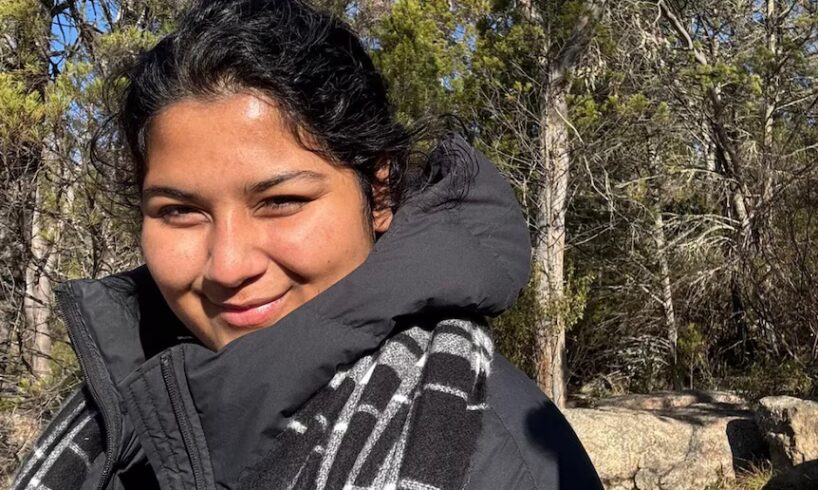
Alipriya Biswas was so short of money when she began studying in Australia, she lived on rice and tinned tuna for a year.
When the 21-year-old journalism student moved from India to Melbourne, she had no friends or family for support — and spent her first night without a bedsheet.
“$200 a week is nothing for an Australian to live on,” she said.
“But that’s all I had.”
Now four years into her studies at the University of Melbourne, Ms Biswas said the experience of international students in Australia was “completely misunderstood”.
Alipriya says she had no references to help her smoothly secure a job. (Supplied: Alipriya Biswas )
“Many people think we come here with endless money from rich families and have everything set up when we get off the plane,” she said.
“But that’s not true.”
International students are frequently blamed for adding to rising costs in Australia since the COVID pandemic — despite reports finding they had not been a major driver of higher rents and inflation.
But international students have told the ABC of their own experiences with Australia’s cost-of-living crisis, saying they were struggling to make ends meet.
Researchers studying the pressures on Australia’s international students say many find themselves in highly precarious financial and living situations.
Alipriya says her first job in Australia was a “not quite legal” bartending job in a club. (Unsplash: Naitian Wang)
“There is a lot of suffering out there amongst international students, an enormous amount of stress and anxiety as they try to not only deal with their academic studies, but also try and survive financially,” said Alan Morris, a professor focusing on urban and housing studies at the University of Technology, Sydney.
He expects even more international students are experiencing financial hardship since he co-authored a 2020 report finding that one in five were skipping meals because they were short of money.
“For some students, they are very isolated and it’s a battle from day one.”
International students come to Australia under visa rules limiting how much they can work while studying, and that require them to have money for living costs before arriving.
They have to prove they have access to $30,000 in order to secure their visas.
Students are only allowed to work 48 hours a fortnight while studying — a rule aiming to let them focus on their learning.
But experts warn the solution to their financial stress is not as simple as changing these visa rules — which they say risks creating other problems for students.
‘I was under huge stress’
Ms Biswas’s parents made “countless sacrifices” to fund her studies — including cutting back on meals and surviving mostly on lentils and rice back home.
While she proved she had access to $30,000 for living costs and secured her visa, she said the family could only afford to release small amounts after she moved to Melbourne.
The money was not enough, and after six months looking for work, she found a bartending job that helped support her through her studies.
More uncertainty on the cards for international students
Professor Morris said in many cases, while families of international students paid tuition fees, they expected them to work and pay their own living costs.
About 36 per cent of students relied on paid work for their main income, and for students from low-income countries, that figure was 78 per cent, according to the 2020 report on international students.
“Those students that come from low-income families [are] especially vulnerable because they can’t go back to their parents necessarily and ask for more money,” Professor Morris said.
Others who could receive more help from their families were reluctant to ask.
International students have not driven rents and inflation substantially higher, RBA says
One international student from China studying at the Australian National University, who asked to remain anonymous, said she was surprised at the high cost of food in Australia.
“In China, restaurants are very cheap. We eat out a lot — it’s part of our lifestyle,” she said.
“Here, it’s impossible. I ate instant noodles or fast food until I found work.”
She started working up to the maximum 48 hours a fortnight on top of her studies to keep up with costs, rather than ask her family for more help.
The pressures of working while studying felt overwhelming at times.
“Uni is very hard … and I was under huge stress at that time,” she said.
“I couldn’t really sleep well and … I was very anxious about many things.”
Even for international students who work, the income does not always cover living costs, according to Queenie Kwan Yee Siu, an ANU researcher focusing on the Hong Kong diaspora.
Some international students are surprised by the cost of eating out in Australia compared to their home countries. (Unsplash: Angelyn Sanjorjo)
Professor Morris said international students also found paid work impacted their studies.
“Some students find themselves working two to three jobs and of course their academic results suffer dramatically,” he said.
“They tend to underplay their academic work because they’re so focused on trying to survive.”
Phil Honeywood, chief executive of the International Education Association of Australia, warned against letting international students work more hours, saying it could backfire on their academic performance.
Experts say income from work does not always cover living costs for international students. (ABC News: Maani Truu)
“They’re here to study first — work is there to supplement living costs,” he said.
“Working more hours won’t solve the crisis.”
But experts also express doubts about requiring students to have access to more savings to pay living costs, to secure their visas.
“The problem is that cuts out a lot of opportunities for some students to get here in the first place … in a sense, it’s robbing Peter to pay Paul,” said Gaby Ramia, a professor of policy and society at the University of Sydney.
Looking for a ‘win-win’ on housing
For My Huynh Ngoc Giang, a 21-year-old IT student from Vietnam, the decision to study in Australia was about comfort and opportunity.
But when she settled on moving to Melbourne, she had not factored in its soaring living costs — especially in housing.
My Huynh Ngoc Giang says international students face some barriers in finding housing. (ABC News: Libby Hogan)
“The rental market is so competitive,” she said.
“It took me months to find a place. International students don’t stand a chance [without] rental history.”
At first, she moved into student accommodation, which cost $500 a week for what she described as “a tiny space”.
“You can touch both walls with your arms,” she said.
“Even military barracks have more space.”
She found a cheaper share house in the suburbs after several months, although that came with new trade-offs, including long commutes and safety concerns such as travelling home late from class.
Professor Morris said Australia’s rising housing costs were likely to have left international students even more financially vulnerable since the pandemic.
“Even finding accommodation would be very difficult,” he said.
Australia could look to innovations overseas for solutions, including in Canada, where some international students were living with older people, Professor Morris said.
“In exchange for cheaper rents, the student helps the elder person in terms of washing up, taking the dustbins out, maybe watches TV a couple of nights a week with them,” he said.
“It’s a win-win situation.
“I really do feel that there’s capacity for [universities] to think of more innovative solutions rather than just letting international students find their way.”
Professor Ramia said access to public transport concessions equal to domestic students, and access to healthcare benefits would also help relieve pressure.
What it’s really like to be an international student in Australia
Experts also said there was information available to help students research Australia’s living costs before deciding to move, while the Australian government also has an online calculator tool.
A spokesperson for Assistant Minister for International Education, Julian Hill, said the federal government was “sympathetic to the financial stress that some international students may face while studying in Australia”.
“It is important to remember that international students are required to demonstrate their ability to financially support their studies prior to coming to Australia as part of the student visa application process,” they said.
“We want international students to be able to do what they came here to do. Settings around work hours are designed to strike a balance between providing opportunities for international students to work without compromising their education.”
Adapting to cost of living pressures
Despite its living costs, researchers say Australia remains attractive for international students compared to other countries.
There were more than 1 million international student enrolments last year.
“We’re one of the only countries where students can bring their partners, who can work full-time,” Mr Honeywood said.
Australia also offers two to three years of full-time post-study work, helping graduates repay loans and build careers, he said.
Ms Queenie Siu, the ANU researcher, said many students were also using their experiences of the cost-of-living crisis as a chance to pick up new skills helping them cut costs, like cooking or driving.
“That’s still very attractive to international students,” she said.
My Huynh says finding housing took months of networking and searching. (ABC News: Libby Hogan)
For My Huynh, adapting to her new home means finding ways to make savings where she can.
“Late-night supermarket discounts help too. You just have to be proactive and try things you never thought you would before.”





